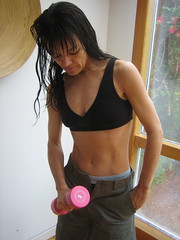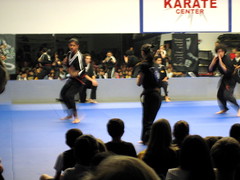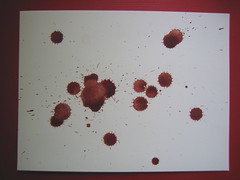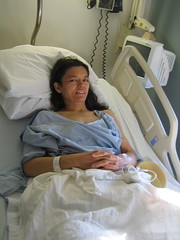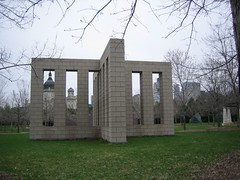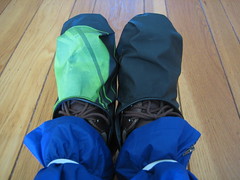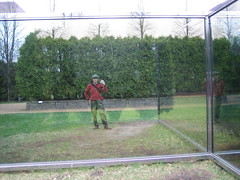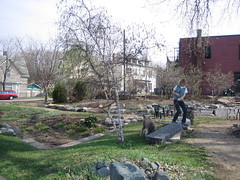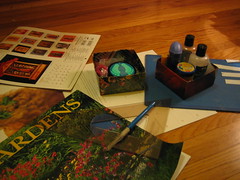Losing Some Of My Parts
I gave my uterine fibroids the boot, as so many women have before me, with a hysterectomy. So now I get to tell the tale, actually two tales, a hero's journey of the body.
With elective surgery, the question becomes at what point do you say you've had enough? With fibroids it's usually the heavy bleeding, the can't-leave-the-house periods. I had the bleeding, but I could still manage since it was only one bad day a month. I had been lucky. I hadn't bled into my socks or had some other unfortunate incident while away from home.
For many women the deciding point comes when they can't have sex because the fibroids have taken up so much space, no one can get in there. Not exactly an issue for me, but my breaking point did have to do with how I used my body. I couldn't do a leaping, spinning back kick without those tennis ball size orbs slamming against my bladder and causing it to leak. This made me mad because it was a problem I couldn't overcome with better technique. But more worrisome was my energy level.
I had been working on my black belt since January and the extra training had pushed me into a state of fitness that now demanded a constant intake of calories. I spent all day eating and on my way home from class I'd be thinking of what I could eat next.
"Your tits are melting away", Catherine said. I now had the body I wish I had as a teenager. I hadn't wanted to grow breasts. By the time I went to college I had a pair that women seemed to envy. There was some compensation in that. When I took up kung fu ten years later, they were brought down a notch. Now they were further diminished. Did Catherine mind? She didn't say. Did I mind? No, not really. My shoulders and upper arms looked so buff in capped sleeve t-shirts and my stomach was a backboard. I was wiry and strong, an Amazon warrior.
I did not pass the black belt test by February. I had forgotten some of the older techniques. During a kata (a long choreographed set of techniques) we were performing, I was suddenly intimidated by the superior performance of one of the black belts and I went into a sort of mental freeze, unable to think what was next. I could see on the faces of my classmates that I had failed. We were marked down for being hesitant.
So, it was not my physical strength that was holding me back. My mind was cluttered, I realized, cluttered with "positive thinking"—visions of grandeur, the stories I would tell. I needed to rehearse the katas and techniques in my mind so they wouldn't fly out of my head under stress. Then in class, I needed to clear everything from my mind and concentrate on what the teacher was saying, even though I'd heard it before. This was an in-the-moment thing. I didn't have to wait to be attacked to wake up to the moment. Duh! How Buddhist. Buddhism was after all the underlying principle of the Asian martial arts. Yes, now you understand, Grasshopper.
Buddhism was my cultural background, but I had not taken up kung fu because I was on a spiritual path. I had taken it up because of the Take Back The Night march in the '70s that brought attention to the ongoing assault on women. Then, of course, there was the fag-bashing going on every weekend in the city. An article in a gay publication showed a picture of the 7-eleven store, at the edge of the Castro street neighborhood, where perpetrators would tank up on beer to get ready for their raids. The community armed itself with whistles. I wore mine on the end of a dog's choke chain, snapped to my leather motorcycle jacket. My feet were shod in steel toe black work boots. Nor was I the only dyke taking martial arts. In the Pride parade, I saw them perform, all lesbian teams of them...
After I failed my black belt test I threw myself into rehearsals for the school demo and there I could appreciate the talent of the six to twelve year olds from the children's classes, as night after night, the boys threw back flips on cue and the girls performed weapon katas, yelling ferociously. The school was my only exposure to children, something I would come to value over time.
While I waited to be tested again, I contemplated how to maintain my strength.
"I can't seem to eat enough," I told my doctor.
"That could be related to the anemia," she said. I'd been taking iron supplements for two years now, but this year I wasn't keeping up. I took a lot of naps, too. She asked why I hadn't had the surgery by now. Because the recovery would be six weeks and that would set me back so far it would be forever before I made my black belt. And I'd already been in class for practically forever; it would be twenty years in September. Soon I would be geriatric. She recommended another doctor for a second opinion—Kate O'Hanlon.
"Wow, she's famous," I said. My doctor had no idea, not being in the lesbian community. Kate had advocated for domestic partner visitor rights at Stanford hospital, among other things, and was the hotshot surgeon everyone went to for breast cancer surgery. I had met her several times at parties.
She remembered me. She told me she could do my surgery laparoscopically and that it would only be a two-week recovery. Only two weeks? A miracle. She made the other doc, I was going to go with, sound like a butcher. I was so happy, I scheduled the surgery for two weeks out.
I wrote my instructors, Mr. and Mrs. Kane, a note about how I couldn't take the extra classes for belt advancement because I would be recovering from surgery. They acknowledged this, but said no more about it. I figured I would be coming back to build myself back up after the surgery. Still Mr. Kane kept an eye on me, especially while performing one of the advanced katas. He had me perform it solo in front of class and all the intimidating black belts. The kata was called, appropriately, Magic Phoenix. I gave it my fiercest best, stumbling slightly at one point, since we had had a long hard workout that night. Near the end, I paused, my mind going blank. One of my mates called out to me the name of the move and I finished it, breathing hard. My coach let it go, said I did well. I had already done it the night before, perfectly, for the lower belt class.
The final class of the week was again unrelenting. I was beginning to wonder if this was a new standard. Non-stop rounds of kicking the bag, footwork drills, shadow boxing and jumping rope, finishing off with 50 push-ups. When we were done Mrs. Kane took me into the office. I thought she was going to talk about my being away. After more words than we'd ever exchanged in the eight years they had owned the school, she told me I was being awarded the black belt. My mouth dropped open. They had been testing me without telling me.
"We could have beat you up a bit more, but we are confident that you can defend yourself on the street," she said, then went on to speak of my black belt attitude, coming back after failing the test the first time, showing I was committed to whatever it took. "You have heart," she said. She asked how long I'd been coming to class and noted that I wasn't getting any younger, after all. "You are a role model here," she said, "there are forty-year-olds, thirty-year-olds who look up to you, all the way down to the youngest who's thirteen". Really, I thought, the kids don't think I'm a dork? I could never tell. But there outside the office, the entire class was all lined up waiting for me to come out. They applauded me and I walked up to each one to exchange the karate handshake and from most a hug. It was something.
So when the admitting nurse checked my blood pressure and said I was in great shape, I proudly told her I just got my black belt that week. Turns out her son was in my class and had told her about my being awarded the belt. That was such a serendipitous coincidence, I actually got excited about this procedure.
"Don't you want the happy juice," Catherine asked, "it will relax you".
"I feel fine," I said, "how about you?" She gave me a scared-out-of-her-wits cartoon face. I laughed. "It's just like flying," I said. She was thinking of all the worse case scenarios, but I firmly refused to go there any more than I would open an airlock on the Battlestar Gallactica. Some things were not worth risking the psychic energy. It could suck you inside out.
"You're the one who wants the drugs," the nurse joked to Catherine, then asked if she was going to be picking me up to take me home the next day.
"I thought we'd walk home," I said half joking. The hospital was just a few blocks from our house.
"I'm going to pretend I didn't hear that", she said. And she warned me sternly not to over do it afterwards; after all, I was removing a major organ.
Yes, that organ, the one that embodied all that was female. I had, at one time, spent several years thinking about having a child, reading Mothering Magazine and searching for a father/donor. I talked to my ghost child quite a lot during that time, monologing all that I wanted to tell it about life. In the end it was more about me not wanting to be a tribe of one. Eventually I let it go with no regrets. Too old, now, anyway. I said goodbye to the uterus I never used.
Kate said she'd throw in an appendectomy for free, which she routinely did because she didn't want it causing any trouble down the line. She wanted to take the ovaries too, to reduce the potential for ovarian cancer, but she let me keep them. Somehow I still felt I had a use for them even apart from the whole hormonal shut down.
"How do you feel?" Kate asked me when I arrived in the operating room via gurney. (I had enjoyed the ride, gliding down the hall, amusement park, fun house style.) She looked smaller from table height. Wiry and thin, she too, had been a martial artist.
"Great," I said, "I've already done the hard part." The bowel prep.; the vile bio-Drano you have to drink. Then filling yourself up like a sink and waiting for it all to drain through in about the same time as it works in a real sink. Yes, ecstatic to be past that part. Put me under.
Dreamt about being in some sunny warm place, going to meet someone. Opened my eyes to see a good looking male nurse with a thick black mustache, stroking my hand and smiling at me. I smiled back. A male nurse was so unusual; I liked him immediately.
"You're not breathing," he told me, "take a deep breath when you hear the beep."
"You mean I have to breath consciously?" I asked.
"Yeah." He didn't seem too worried about it, so neither was I. Then he walked away. The machine beeped again. "Amanda," he called out, from the nurses' station, "keep breathing".
I couldn't seem to connect the beeping with my well-being. We spent the afternoon there, with my guy calling my name over and over, singing it to me and everybody in the recovery room with me.
Kate came by, told me it was a big uterus as if we'd just gone out fishing. She was going to send it in to be weighed. (Later she reported that it was nine times its usual size.)
I was surprised to see the clock said 5 p.m. My surgery had been at 12:45 p.m. and I was still sleepy. Wasn't it quitting time? I was almost the last one there.
"Can I breath and sleep at the same time?" I asked my nurse guy.
"Uh, yeah, you can do that." I was just beginning to realize the absurdity of this conversation when, finally, the beeping stopped and I was being wheeled out of there.
Catherine arrived at my room just as I was pulling up. My mother showed up shortly after. The nurse was taking my info. I wanted to try out all my brain cells on them, use new words like "ambulate", make them listen to stories that had nothing to do with anything. It was going to be a new lease on life, after this pit stop. As soon as my gut stopped feeling like a herd of large animals had tramped through.
Labels: black belt, hysterectomy, surgery
